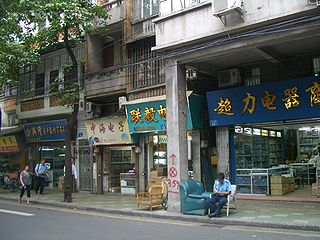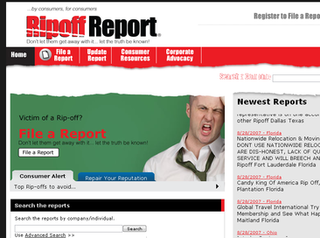Telephone slamming is an illegal telecommunications practice, in which a subscriber's telephone service is changed without their consent. Slamming became a more visible issue after the deregulation of the telecommunications industry in the mid-1980s, especially after several price wars between the major telecommunications companies. The term slamming was coined by Mick Ahearn, who was a consumer marketing manager at AT&T in September 1987. The inspiration for the term came from the ease at which a competitor could switch a customer's service away from AT&T by falsely notifying a telephone company that an AT&T customer had elected to switch to their service. This process gave AT&T's competitors a "slam dunk" method for the unauthorized switching of a customer's long-distance service. The term slamming became an industry standard term for this practice.
The Better Business Bureau (BBB) is an American private, 501(c)(6) nonprofit organization founded in 1912. BBB's self-described mission is to focus on advancing marketplace trust, consisting of 92 independently incorporated local BBB organizations in the United States and Canada, coordinated under the International Association of Better Business Bureaus (IABBB) in Arlington, Virginia.
TransUnion LLC is an American consumer credit reporting agency. TransUnion collects and aggregates information on over one billion individual consumers in over thirty countries including "200 million files profiling nearly every credit-active consumer in the United States". Its customers include over 65,000 businesses. Based in Chicago, Illinois, TransUnion's 2014 revenue was US$1.3 billion. It is the smallest of the three largest credit agencies, along with Experian and Equifax.

Online shopping is a form of electronic commerce which allows consumers to directly buy goods or services from a seller over the Internet using a web browser or a mobile app. Consumers find a product of interest by visiting the website of the retailer directly or by searching among alternative vendors using a shopping search engine, which displays the same product's availability and pricing at different e-retailers. As of 2020, customers can shop online using a range of different computers and devices, including desktop computers, laptops, tablet computers and smartphones.

Business-to-business is a situation where one business makes a commercial transaction with another. This typically occurs when:
Search engine marketing (SEM) is a form of Internet marketing that involves the promotion of websites by increasing their visibility in search engine results pages (SERPs) primarily through paid advertising. SEM may incorporate search engine optimization (SEO), which adjusts or rewrites website content and site architecture to achieve a higher ranking in search engine results pages to enhance pay per click (PPC) listings and increase the Call to action (CTA) on the website.

The Financial Ombudsman Service is an ombudsman in the United Kingdom. It was established in 2000, and given statutory powers in 2001 by the Financial Services and Markets Act 2000, to help settle disputes between consumers and UK-based businesses providing financial services, such as banks, building societies, insurance companies, investment firms, financial advisers and finance companies.
A wholesale list is a piece of compilational media providing details for various wholesale companies. One can use a wholesale list to save hours of researching about wholesaling companies as the producer of a wholesale list will already have done it. For example, a wholesale list may contain details of companies which sell computers at wholesaler prices to customers. Someone wanting to buy computers at wholesale prices need not spend time and effort hunting for the companies, as there is already a wholesale list on that product existing.

Ripoff Report is a private for-profit website founded by Ed Magedson. The Ripoff Report has been online since December 1998 and is operated by Xcentric Ventures, LLC which is based in Tempe, Arizona. In 2023 an Australian judge found the company purports to be a consumer review site but profits from extortive business practices.
Economic discrimination is discrimination based on economic factors. These factors can include job availability, wages, the prices and/or availability of goods and services, and the amount of capital investment funding available to minorities for business. This can include discrimination against workers, consumers, and minority-owned businesses.
A direct public offering (DPO) is a method by which a company can offer an investment opportunity directly to the public.
The Data & Marketing Association formerly, Direct Marketing Association (DMA) is a trade organization for marketers. In 2017, their web site stated, "Yes, 100 years ago we were the Direct Mail Marketing Association and then the Direct Marketing Association. Now we embrace …"
A travel website is a website that provides travel reviews, trip fares, or a combination of both. Over 1.5 billion people book travel per year, 70% of which is done online.

MyLife is an American information brokerage firm. Founded by Jeffrey Tinsley in 2002 as Reunion.com, it changed names following a 2008 merger with Wink.com. MyLife gathers personal information through public records and other sources to automatically generate a "MyLife Public Page" for each person. These pages can list a variety of personal information, including an individual's age, past and current home addresses, phone numbers, email addresses, employers, education, photographs, relatives, political affiliations, a mini-biography.

A consumer complaint or customer complaint is "an expression of dissatisfaction on a consumer's behalf to a responsible party". It can also be described in a positive sense as a report from a consumer providing documentation about a problem with a product or service.
The DGCOS is an independent UK regulatory body, whose agenda includes vetting of suppliers, guaranteeing customer access to industry inspectors, and protecting members against unfounded complaints.
Post-transaction marketing is a deceptive marketing practice used by many companies, which have then been subject to investigation, charges from state attorneys general, and class action lawsuits.

Is Anybody Down? was a revenge porn website founded by Craig Brittain and Chance Trahan where users could anonymously upload nude photographs along with information identifying the person in the photograph. The site also contained a section of nude photographs titled "Anonymous Bounty", where users were offered "free stuff" if they could provide the Facebook or Twitter information of any of the people pictured. In concept, the website recapitulated the now-defunct Is Anyone Up?, which was shut down in April 2012, shortly before an FBI investigation into the propriety of the site.

Untied.com was a website critical of United Airlines that logs complaints from passengers. The name untied.com transposes two of the letters of the name "United" and also suggests disorder. Kevin Simpson of the Denver Post said in 2000 that "The Untied.com phenomenon mirrors the online trend in consumer activism that has caught on with the disgruntled flying public this summer travel season." In 1998 Laura Bly of the Los Angeles Times said that Untied.com was "One of the most visible efforts to chastise a travel company in cyberspace". In 1998 Jeremy Cooperstock, the website founder, said that Untied.com was "a Web site that offers frustrated former United Airlines passengers a chance to speak out."
dunkindonuts.org was a "gripe" website operated for two years by David Felton, a 25-year-old school teacher from Hamden, Connecticut. Felton founded the site in 1997 after he discovered that Dunkin' Donuts coffee stores in Hartford, Connecticut did not carry certain items, such as 1% milk. The site was established as a hotbed for complaints, inviting Dunkin' Donuts customers and disgruntled employees to vent their opinions about the company and its service for the world to see.








